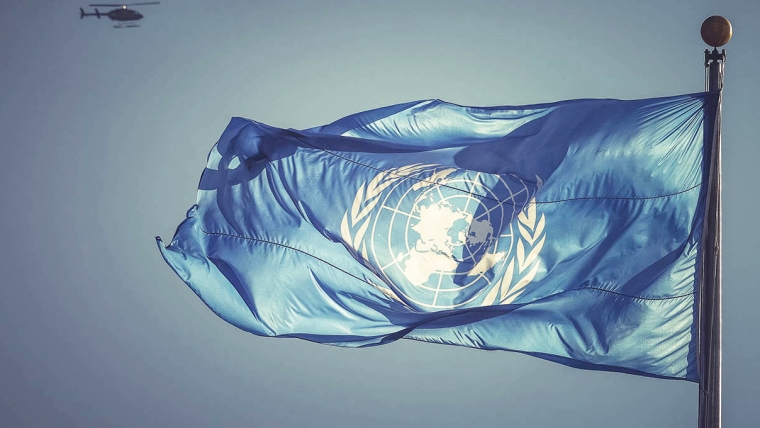
Over the last two weeks, Israel has repeatedly attacked Syria – destroying military facilities and occupying territory – in clear violation of the United Nations Charter, which forbids the use of military force against foreign states except in self-defense or with the authorization of the Security Council.
While some countries have condemned Israel, the United States and most others are withholding criticism. They probably fear that if Syria’s weapons are not destroyed, they could fall into the hands of terrorist organizations. Never mind that international law does not allow for such exceptions; it has become another casualty of events.
Israel’s strikes in Syria are hardly an isolated example. The ruins of international law are all around us. Russia invaded Ukraine in 2014 and again in 2022, illegally annexed Ukrainian territory, committed atrocities against Ukrainian soldiers and civilians, and now faces accusations of genocide. China has used violence to expand its control over the South China Sea, and it now seems poised to invade Taiwan – an outcome that no one believes will be stopped by international law.
Moreover, the US military interventions in Afghanistan, Iraq, Libya, Syria, and elsewhere over the past few decades were all based on dubious legal theories. International crimes are occurring worldwide, in conflict-ridden places like Israel and Gaza, Myanmar, Ethiopia, and Sudan, and within authoritarian countries that are at peace.
Nor are wars and violence the only indications of international law’s decline. The same trend afflicts the global economy. With its appellate body unable to function, the World Trade Organization has sat by helplessly as the world turns to protectionism. Likewise, the International Court of Justice and the International Criminal Court’s feeble records make a mockery of their founders’ ambitions. The ICJ was supposed to prevent war, and the ICC to ensure justice for victims of war crimes. But neither court does much at all.
A less visible, but equally important, development is that international investment law has provoked a backlash from its intended beneficiaries. Bilateral investment treaties were supposed to promote economic development in poorer countries by protecting foreign investors from expropriation. But there is little evidence that the law has helped these countries catch up. Instead, multinational corporations have used it to block developing countries from implementing economic reforms and environmental regulations that might cut into their margins.
Meanwhile, international law protecting migrants has spurred a nativist backlash in many destination countries, especially those that have been flooded with asylum seekers. As democracy recedes around the world, human-rights law is in tatters. Many governments are stripping citizens of basic legal protections, and political repression is on the rise in countries once thought to be on the road to political freedom. Even the European Union, the most successful international organization, lost the United Kingdom, has had to contend with illiberal governments in Hungary and, until recently, Poland, and faces new challenges as Euroskeptic far-right parties gain power in its member states.
In the United States, Donald Trump won the 2024 presidential election despite, or perhaps because of, his contempt for international law. In his first term, the US withdrew from more than a dozen international agreements and organizations relating to security, human rights, climate change, and migration. Now, Trump plans to withdraw the US from the World Health Organization, as benign an international institution as there is, on the first day of his next term. But Barack Obama and Joe Biden also did little to promote international law during their respective terms. US recalcitrance has been bipartisan.
Why has this happened? The simplest explanation is that international law is a victim of the anti-globalization backlash. Globalization was once the promised path to freedom and riches, but today people associate it with uncontrolled migration, job loss, pandemics, financial crises, and conflict. The benefits it generated for global economic growth were not sufficiently large, widespread, or visible to offset the real or perceived harms.
But international law was supposed to lock into place a liberal global order. In the 1990s, officials and commentators argued that international law enforces itself: as it spreads, it is internalized by states through their bureaucracies and further entrenched by public opinion. In fact, international law exists only to the extent that states – meaning their leaders, elites, and public – are willing and able to enforce it.
Enforcing international law is costly to the enforcer, who must impose sanctions, cut off diplomatic relations, or engage in other actions that may harm it as much as, or more than, the violator. As governments increasingly realized that the law stood in the way of their objectives, which change in response to changes in domestic needs and international relations, the incentive to maintain it waned. It didn’t help that by the 1990s, it was common to claim that international law reached deep into states’ traditional jurisdictions, with provisions to regulate family relations, religious norms, cultural values, and the organization of the economy.
Supporters of international law believed that it would spur countries to adopt common moral and political values; it obviously has not. They also believed that countries would kneel to the Washington Consensus – free trade and investment, property rights, robust markets, low taxes – since all these things seemed to make sense in the US and the West in the 1990s. But such policies turned out to be hard to impose on other countries and – we now know – hard to sustain at home. National prosperity depends on stability, and stability requires the broad sharing of economic benefits, respect for local cultures and norms, and a sense among citizens that their political leaders answer to them, not to the foreign NGOs and international bureaucracies that have become convenient political footballs.
In the past, international law focused on protecting sovereignty, establishing basic forms of coordination (such as borders, time zones, maritime rules, and communication protocols), and, with more limited success, restricting the most extreme forms of violence, especially in war. Quite a few states, and not just China and Russia, have long urged the world to return to this modest but sustainable approach. The US, championing liberal internationalism, stood in the way. Under Trump, it may join them.
Eric Posner, a professor at the University of Chicago Law School, is the author of How Antitrust Failed Workers (Oxford University Press, 2021). This content is © Project Syndicate, 2025, and is here with permission.

We welcome your comments below. If you are not already registered, please register to comment
Remember we welcome robust, respectful and insightful debate. We don't welcome abusive or defamatory comments and will de-register those repeatedly making such comments. Our current comment policy is here.